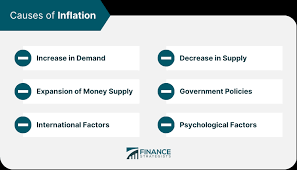Definition: Inflation refers to the general increase in the prices of goods and services in an economy over time. This means that a unit of currency, like a dollar or taka, buys you less and less as time goes by.
Click the Translate button(see right) on this post to set your Own Language to understand more perfectly!!
Inflatation Calculator
Continue Definition:
Inflation refers to the general increase in the prices of goods and services in an economy over time. This means that a unit of currency, like a dollar or taka, buys you less and less as time goes by.
Here's a breakdown of key concepts related to inflation:
Rate of Inflation: This is the percentage increase in prices compared to a specific period, usually a year. It reflects how quickly the purchasing power of your money is declining.
Consumer Price Index (CPI): This is a common index used to measure inflation. It tracks the average price changes for a basket of goods and services that a typical consumer might buy. By comparing the CPI of one year to another, we can calculate the inflation rate.
Equation:
Inflation Rate (%) = ((CPI(current year) - CPI(previous year)) / CPI(previous year)) x 100
Example:
Let's say the CPI in 2023 was 100 and the CPI in 2024 is 105. Using the above formula, the inflation rate for 2024 would be:
Inflation Rate (%) = ((105 - 100) / 100) x 100 = 5%
This means that prices on average have increased by 5% in 2024 compared to 2023. So, with the same amount of money in 2024, you can buy 5% fewer goods and services than you could in 2023.
Properties of Inflation
Inflation has both positive and negative effects on an economy. Here's a look at its properties:
Modest Inflation: A low and steady rate of inflation (around 2-3%) is generally considered healthy for an economy. It encourages spending and investment, which can lead to economic growth.
High Inflation: When inflation spirals out of control, it can be very damaging. It reduces purchasing power, discourages saving, and creates uncertainty for businesses. In extreme cases, it can lead to hyperinflation, where prices increase rapidly, causing economic collapse.
Deflation: The opposite of inflation is deflation, where prices decrease over time. While it may seem like a good thing at first, deflation can also be harmful. It can lead to decreased spending, lower wages, and economic stagnation.
Understanding inflation is crucial for navigating the economy effectively. By knowing how inflation affects prices and your purchasing power, you can make better decisions about spending, saving, and investing.
How it is Possible to Earn Money by the calculation of Inflation????
You can't directly earn money by simply calculating inflation itself. However, understanding inflation can help you make informed financial decisions that can potentially grow your wealth or protect it from inflation's erosive effects.
Here are a couple of ways:
Investing in Inflation-Hedging Assets:
Treasury Inflation-Protected Securities (TIPS): These are U.S. government bonds where the principal value adjusts based on inflation. As inflation rises, the value of your TIPS investment goes up, protecting your purchasing power.
Commodities: These are real assets like gold, oil, or agricultural products. Their prices tend to rise with inflation as demand increases due to the declining value of currency.
Real Estate: Property values often rise over time, potentially outpacing inflation and offering a hedge against its effects. However, real estate is a complex investment with its own set of risks.
Making Investment Decisions based on Inflation:
Considering Inflation in Returns: When evaluating investment performance, you should factor in inflation. A 10% return on your investment might sound good, but if inflation is at 5%, your real return (your purchasing power gain) is only 5%.
Adjusting Investment Strategies: During periods of high inflation, you might want to shift your portfolio towards assets that tend to perform well in such environments, like TIPS or commodities.
By understanding inflation and its impact on different asset classes, you can make informed investment choices that can potentially grow your wealth and protect it from inflation's grip.
Do YOU Want To Earn Money In Various Ways, Click The Link & Explore Your Field of Interest!!!







No comments:
Post a Comment